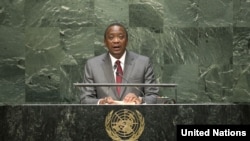A human rights campaigner said Kenyan President Uhuru Kenyatta has a legal obligation to obey the orders of judges at the International Criminal Court (ICC) to be present at a hearing on October eighth to determine the starting date of his trial.
Kenyatta is charged with crimes against humanity for allegedly orchestrating the 2007 post-election violence that resulted in the deaths of an estimated 1,000 people.
Richard Dicker, director of the International Justice program at Human Rights Watch said President Kenyatta cannot use executive responsibilities as an excuse.
“President Kenyatta as an accused before the International Criminal Court has an obligation to obey and follow the orders the judges issued. So, as they have done in ordering his appearance on October 8th, President Kenyatta has a legal obligation to comply apply with that,” he said.
It is not clear if President Kenyatta would appear in person at the ICC on October 8. His spokesman Manoah Esipisu reportedly said the president had “no reaction” yet to the court’s order.
Kenyatta’s lawyers had asked that he be excused; citing a summit in Uganda's capital Kampala on the same day which Kenyatta had to attend "as President of Kenya and the chairman of the Heads of State of the East African Community."
Dicker dismissed suggestion that the ICC lawyers’ insistence for the Kenyan leader’s appearance in person is disrespect to the presidency.
He said the ICC judges had shown understanding of Kenyatta’s schedule. On the other hand, Dicker said it is President Kenyatta’s office that has shown contempt for the court.
“In terms of disrespectful, I think the president and some around him have been intensely disrespectful of the court that they had pledged to cooperate with when he (Kenyatta) was a presidential candidate,” he said.
David Nyekorach Matsanga of the Pan African Forum and a staunch anti-ICC advocate said the ICC has no case against President Kenyatta and will most likely dismiss the charges comes October 8.
Dicker said as a human rights lawyer he believes in a trial when there is evidence and no trial when there is insufficient evidence.
But Dicker said in the event the Kenyatta case is dismissed the victims of the 2007 post-election violence would be the big losers.
“If there is no evidence, it is hard to imagine a case going to trial. I think the real losers here are the victims of the horrible post-election violence that happened 2007 and 2008, and the Kenyan people more broadly for whom many decades of election violence have led to no accountability and absolute impunity,” Dicker said.
President Kenyatta’s anti-ICC efforts crusade led to an African Union declaration last year that African leaders should have immunity from prosecution.
The ICC didn't go that far, but agreed to change its rules to allow Kenyatta to use video links instead of attending in person so he could fulfill his presidential duties.
ICC prosecutor and Gambian-born Fatou Bensouda delayed the trial indefinitely, citing lack of evidence.
Bensouda said she has faced “unprecedented” obstruction from Kenya’s government since Kenyatta became president.




